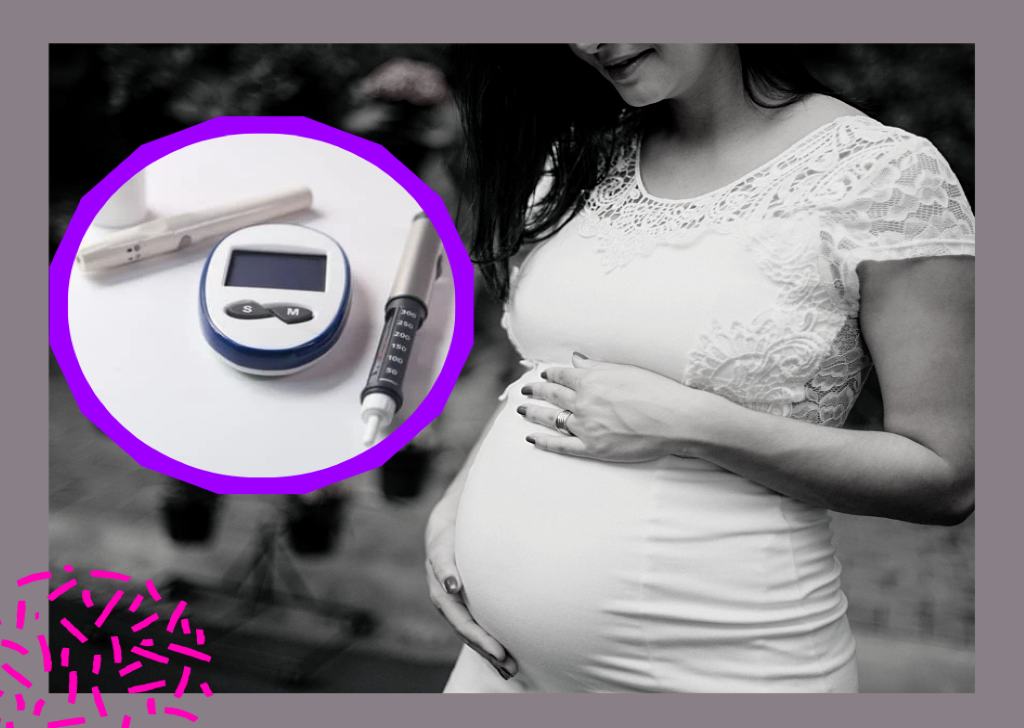What is gestational diabetes?
Gestational diabetes is a type of diabetes that is diagnosed in a pregnant woman who did not have diabetes before pregnancy. Some women are affected by more than one pregnancy related diabetes. Doctors usually test you for gestational diabetes in the middle of the pregnancy where it falls between 24 and 28 weeks. Generally it can be controlled by eating a healthy diet and exercising regularly. Sometimes, if needed insulin is recommended by the doctor for few woman with diabetes during pregnancy.
What are the causes of gestational diabetes?
During pregnancy, the pancreas sends enough amount of insulin to regulate the blood sugar level. Gestational diabetes actually occurs when hormones from the placenta block insulin or your body can’t make enough insulin and that prevents the body from regulating the increased blood sugar of pregnancy effectively. This causes hyperglycemia which is higher levels of blood sugar that can damage the nerves, blood vessels and organs in your body.
There is an increased chance for gestational diabetes based on certain factors like being overweight as the extra weight affects insulin’s ability to keep blood sugar level inline, having higher level of abdominal fat, aged pregnancy, diabetes runs in family history, if you had gestational diabetes in your previous pregnancy, if you are pre- diabetic, or any other medical condition associated with the development of diabetes or if you are pregnant with multiples.
Symptoms of gestational diabetes
Not all the women who have gestational diabetes experience the symptoms but few may experience
- Unusual thirst
- Increased frequent urination
- Fatigue
- Weight loss/ Weight gain
- Blurred vision
- Yeast infections
But some of the above symptoms may be difficult to differentiate from the normal symptoms of pregnancy.
How is gestational diabetes diagnosed?
At periodical prenatal visit, your doctor asks for the urine test to be done, in order to check for sugar in your urine, which can be a sign for gestational diabetes. But only with this screening, it doesn’t necessarily mean you have gestational diabetes.
Generally, between the week of 24 and 28(Second Trimester), initial glucose challenge test is performed where you’ll have to drink sugary liquid and your blood is drawn to test and hour later. If your blood sugar level is higher reading than normal, you’ll need to have glucose tolerance test.
Glucose tolerance test, where you’ll have to drink sugary liquid and blood is drawn at every hour for three hours where in at least two readings are higher than the normal, and then you will be diagnosed with gestational diabetes.
How gestational diabetes is treated?
With proper treatment and regular monitoring of sugar level in your body, diabetes during pregnancy can be managed and is not harmful to you or your baby.
- Monitor your blood sugar level daily Most of the doctors suggest buying a diabetes kit which includes needles and a little machine that reads your blood sugar. It would let us know how your body processes various food and their blood levels. Everyday fasting blood rate is to be noted and then after an hour or two post meal. It empowers you to make good healthy food choices.
- Registered dietitian can help you review healthy food options and make a meal plan.
- Keep a food log after each meal on everything you ate along with your blood glucose reading. This may help you understand what foods are spiking your glucose levels and thus you can avoid them.
- Get moving. Activities are considered important during gestational diabetes. Regular exercises and walking after a meal lowers your glucose levels.
Regular diet and exercises are often enough to control gestational diabetes — but for some women who have higher levels, doctor may suggest to take supplementary insulin to control it. Supplementary insulin can be taken through shots or orally. Follow your prescribed way of treatment.
How is gestational diabetes managed after pregnancy?
Studies show that women with diabetes during pregnancy are 3 to 7 percent more likely to develop type 2 diabetes five to ten years after giving birth. And this is why it is so important to make those healthy habits accustomed to pregnancy and keep track of your health even if your pregnancy is over.
Here are a few ways to stay healthy after a baby is born:
- Continue regular doctor visits. Be sure to have your primary care physician and / or OB-GYN re-assess you after your postpartum visit – six weeks and then every year – to check for ongoing problems with fasting glucose and HbA1c (glycated hemoglobin) levels.
- Talk to a nutritionist. It will help you build your own food storage that will help control your glucose levels.
- Keep eating as healthy as possible every day. Try to avoid sugars and refined carbohydrates that add sugar to your blood and can contribute to the development of type 2 diabetes. Remember, simple sugars and carbs are everywhere – so make sure you read the labels carefully (a healthy dietitian can help you understand the key ingredients to be aware of). Instead, choose raw foods such as vegetables, lean meats, milk and whole grains.
- Breastfeed for as long as possible. Breastfeeding can reduce the risk of developing type 2 diabetes after gestational diabetes. There are many possible explanations, including that breastfeeding women have low levels of glucose circulating in their blood.
- Be active. While it is difficult to stay active with a baby that needs all your attention (and more!), Try to balance your doctor-prescribed exercise with as much as possible to help you lose weight during pregnancy and keep your weight down.
The Takeaway
There comes few tips for a women with gestational diabetes
- Eat a healthy diet from a diabetic diet plan. A nutritionist can help you create a healthy eating plan and you’ll learn to control blood sugar during pregnancy.
- Exercise is another way to keep blood sugar under control. It helps to balance food. After checking with your doctor, you can exercise regularly during and after pregnancy. Get at least 30 minutes of physical activity at least five days a week. This could be brisk walking, swimming, or active play with children
- Monitor Blood Sugar frequently because pregnancy causes the body’s need for energy to change, blood sugar levels can change very quickly. Check your blood sugar regularly, as directed by your doctor.
- Take Insulin, If prescribed by your doctor, take it as prescribed to help keep your blood sugar under control.
- Get tested for Diabetes post six to 12 weeks after pregnancy, and every 1 to 3 years. If left untreated, there is chance to diagnose type 2 diabetes. Even if diabetes subsides after the birth of a child, half of all women with gestational diabetes develop type 2 diabetes later. It is important for a woman with gestational diabetes to continue exercising and eat a healthy diet after pregnancy to prevent or delay the onset of type 2 diabetes.
Referred Articles
- Gestational Diabetes and Pregnancy https://www.cdc.gov/pregnancy/diabetes-gestational.html
- Diagnosis & Management of Gestational Diabetes Mellitus – https://nhm.gov.in/New_Updates_2018/NHM_Components/RMNCH_MH_Guidelines/Gestational-Diabetes-Mellitus.pdf


Nice Article. Very useful for understanding Gestational diabetes.